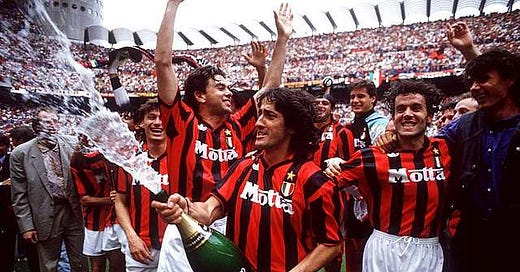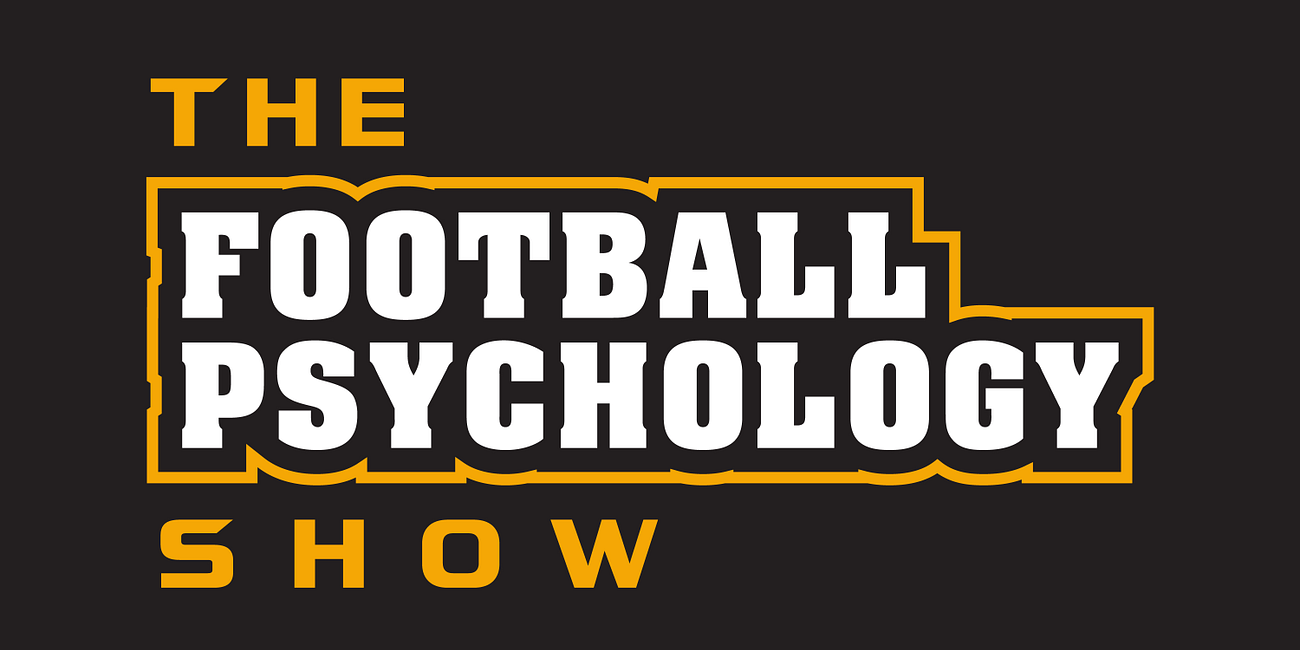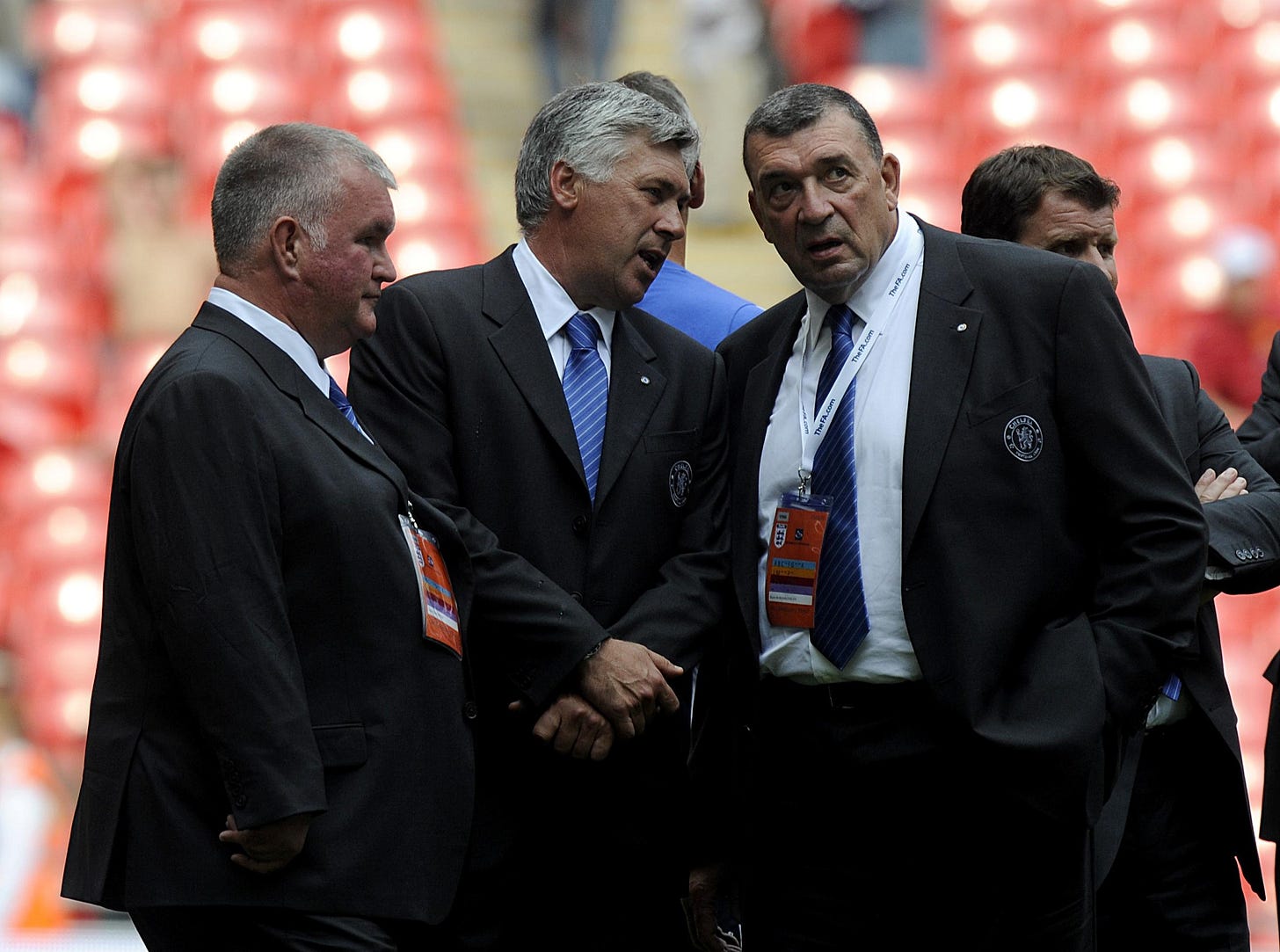AC Milan's 'Mind Room': European football's first psychology laboratory
How neuroscience helped Baresi, Baggio and the rest of the era-defining Rossoneri
Franco Baresi. Roberto Donadoni. Roberto Baggio. The names are synonymous with AC Milan's emergence as a European superpower.
They are also etched into the memory of every Italian fan who witnessed the country's World Cup penalty shootout defeats of 1990 and 1994.
All three spoke of the trauma they felt over missing their spot-kicks. All three sought solace in the Mind Room, Italian football's first psychology laboratory.
Backed by Silvio Berlusconi and hailed by a succession of Milan managers from Arrigo Sacchi to Carlo Ancelotti, the Mind Room helped underpin an unprecedented run of success as the Rossoneri won 21 major trophies during the 23 years it was operational from 1986.
Combining stress relief therapy with cognitive training and neuroscience, the laboratory's impact would be felt as far afield as Chelsea, where its founder constructed a similar setup in 2009.
Things had come a long way since the plan for the first incarnation was hatched, at a meeting between a soon-to-be Italian prime minister and an amateur karate champion.
Dr Bruno Demichelis had been a martial arts student since he was a young teenager. In 1971, aged 24, he was beaten at an international karate competition by a less-fancied Japanese opponent. He struggled to process defeat and returned home to Italy looking for answers.
"It wasn't a technical problem or a physical problem; I was very fit and very well-trained. Eventually, a friend of mine said to me: 'Is it a mental problem?'" recalled Demichelis on the Football Psychology Show in December 2020.
"I realised that I had trained with Japanese people for so long they were no longer just instructors or masters to me. They were my heroes. Psychologically, you cannot defeat your heroes. It was self-sabotage."
Demichelis' questioning prompted an interest in psychology. He eventually completed a PhD in the subject and found work as a consultant to Fininvest, a media conglomerate owned by Silvio Berlusconi.
In February 1986, Berlusconi bought AC Milan. Sensing an opportunity, Demichelis arranged a meeting with the club's new owner. It was a discussion that would his change his life.
AC Milan‘s ‘Mind Room‘: Italian football‘s first psychology lab (with Dr Bruno Demichelis)
Listen now (77 min) | AC Milan's former Scientific Coordinator, Dr Bruno Demichelis, drops by to discuss the 'Mind Room', Italian football's first psychology laboratory. Bruno talks to us about the role the 'Mind Room' played in Milan's success during the 80s, 90s and early 2000s.
Demichelis' pitch was straightforward: you've seen the benefits of psychological support in the business world, now apply it to football. Berlusconi's response was equally direct.
"The owner asked me if I was a Milan fan," Demichelis says.
"I said 'No.' I remember him stepping back a little bit and I thought 'Oh no.' Then he asked me if I was an Inter fan. I said 'No,' and he moved a bit further back. Before he asked me the third question, I said, 'I'm not a fan of any team!'"
Following a two and a half hour meeting, he was appointed as Milan's scientific coordinator, at the time making him Serie A's only practising psychologist.
After a successful start at the club that saw him win the backing of manager Arrigo Sacchi, Demichelis' services were in high demand. Capitalising on the opportunity, he secured investment for a bespoke psychology laboratory based at Milanello, the club's training ground. The Mind Room was born.
Its purpose was two-fold. Firstly, it allowed Demichelis to run group sessions, satisfying the Milan squad's growing appetite for psychological support. Secondly, it provided an opportunity to answer a question he had long wrestled with: how do you attempt to quantify and scientifically support a player's psychological development, linking this to performances on the pitch?
The Mind Room acted as part-sanctuary, part-mental training ground. Groups of up to eight first-team members - sat in state-of-the-art zero gravity chairs - were hooked-up to equipment including polygraph machines, used to monitor indicators such as blood pressure and breathing rates. A glass divide separated the players and a studious Demichelis, who was looking for physiological signs of a player's state of mind (or what he termed "objective data in the 'mental area'").
For example, if a player said he felt inhibited or lacking in confidence because of a muscle strain, Demichelis would conduct an electromyogram test to measure muscular electrical activity.
The readings enabled him to quantify conditions such as post-game 'tightness' and take proportionate remedial action, including carefully calibrated breathing training. In doing so, the Mind Room was not only aiding physical recovery and performance, but also supporting the development of psychological characteristics such as confidence.
Demichelis also used results from Mind Room tests to devise cognitive training exercises. The programmes involved the use of biofeedback devices such as electrodes, which, when placed on a person’s scalp, can monitor the brain’s electrical activity. By seeing how an individual’s neurons behave, it becomes possible to focus on strengthening synapses associated with skills such as problem solving. This type of therapy is designed to help players reconfigure the type of negative 'inner talk' which can affect them in high-pressure situations. Baresi, Baggio and Donadoni were among those treated.
Demichelis, who would go on to join Chelsea in 2006, says: "One of them told me, 'I put the ball down and took three or four steps back. And then a little thought crossed my mind: what if I miss?'"
"He said, 'That hit me. I started looking at the ball like it was a tiger. Then I looked at the coach: another tiger. Then I looked at the players and my teammates: another 21 tigers. Then I thought about the people watching at home. In a moment, I had 4 billion tigers looking at me. I was shaking. I felt confused. I almost felt like crying.'"
Beyond stress relief and cognitive training, the Mind Room also focused on improving players' reaction speeds by using response time tests. Participants were presented with two buttons and a pair of bulbs, clicking the lefthand or righthand button if the corresponding bulb lit up. Flashing arrows - often pointing in the opposite direction to the light which was on - were used to add a greater degree of difficulty to the examination.
Whilst the concept sounds basic, reducing the time it takes for players to respond to rapidly changing on-pitch situations - even by a few tenths of a second - was seen as yet another way in which Milan could extend the careers of stalwarts such as Alessandro Costacurta and Paolo Maldini, who both played until they were 41.
"You can't train 37-year-old players to become physically faster, but you can train them to become faster in analysing situations," Demichelis says.
"If they can process data more quickly, they can make quicker decisions. That's why we were able to keep players going."
Clarence Seedorf was the embodiment of this ethos. Nicknamed 'The Professor' by teammates, Seedorf regularly visited the Mind Room, which was seen as the psychological 'station' within a wider physical and mental 'circuit,' otherwise known as the Milan Lab. The Dutchman's devotion to self-development would pay off in more ways than one.
Demichelis explains: "The General Director of the Milan Lab said to him (Seedorf): 'Wow, you're 31, but fitness-wise you're 26: your biological age is much, much younger.'
"Seedorf said: 'Give me that print out.' He went to the CEO and said: 'Listen to what your lab is saying about me. I am 26, biologically speaking, so extend my contract for four more years.' And they did!"
Seedorf's age-defying physiology was perhaps aided by the daily six-minute health checks Demichelis introduced, as part of his role as the club's scientific coordinator. Combining GPS data with physiological measurements such as heart rate variability, the checks were used to develop a 'risk scoring' system. By monitoring changes to a player's score against a baseline, Demichelis was able to indicate potential susceptibility to injury and proactively apply treatment.
For example, a 10% drop in a player's score would generate a yellow flag, with a 20% reduction resulting in an orange flag. A decrease of 30% would signal a red flag and preventative treatment in the Mind Room.
According to Demichelis, the methods he helped to introduce contributed to Milan reducing soft tissue injuries by 91% during his time at the club. It's a striking statistic made possible in part by the support the Mind Room received at both boardroom and managerial levels.
"I had the players on my side because we had the club on our side. We had the coach on our side because he believed in our philosophy. At the time, he told the players 'You don't play football with your foot, you play football with your brain.' It's a big asset for a sport psychologist," says Demichelis.
Whilst Ancelotti and Demichelis' departure in 2009 effectively ended the Mind Room's use at Milanello, the Italian duo established an equivalent base at Stamford Bridge, after joining Chelsea.
Petr Cech was among a number of players who jumped at the chance of benefitting from the methods Demichelis deployed in Milan, which Professor of Psychology Marc Jones – who has worked with a number of football clubs - describes as genuinely innovative.
"I think it's fair to say the Mind Room was breaking new ground in terms of its integration into the training environment," says Jones.
The Mind Room is a reader-supported publication. To receive new posts and support my work, consider becoming a free or paid subscriber.
"The fact there was a physical presence (within Milan's training ground) was, without doubt, the exception rather than the rule in professional football."
Jones namechecks John Syer and Chris Connolly - who provided psychological support for Tottenham's first team players in the early 1980s - as quasi-forerunners of Demichelis, but you have to look back to 1958 and Brazil's World Cup-winning psychologist João Carvalhaes to find a similarly decorated example of a laboratory dedicated to cognitive skills training.
While Milan's trophy haul goes some way to illustrating the impact of the Mind Room, the public testimony of the managers who backed Demichelis' brainchild is perhaps as telling. In his book 'The Immortals', Sacchi's appreciation of the laboratory is such that he describes Demichelis as 'a psychologist whom I needed more than the players'. Ancelotti, meanwhile, has spoken of the 'value Bruno added (to Chelsea) with his experience of the Milan Lab.'
The appreciation appears to be echoed by the players Demichelis worked with. In 2014, after his appointment as Milan's manager, Seedorf lured his former colleague back to the San Siro.
The reunion was short-lived - Seedorf's managerial reign ended after four months - but the Mind Room's long-term legacy is well-established. Epitomising the innovation that characterised Milan's off-pitch and on-pitch operation during the 1990s, the root of its success lay as much in an age-old premise as it did on modern technology, according to its founder:
"We improved skills that are very well-defined: recovery, attention, stamina, speed in analysing situations and making decisions. The difference is that our players were able to deploy these skills under pressure.
"As a player, you need to have this ability if you're going to take a penalty in the World Cup final."
Reflections on Milan’s ‘Mind Room’
I wrote the above story, chronicling the emergence of European football’s first psychology laboratory, in late 2022, but the origins of the tale go back to a podcast I recorded with Bruno Demichelis (AC Milan’s former Scientific Coordinator) in 2020.
That interview was an insight into the mind of one of the pioneers of sport science’s role in football. It also provided a fascinating glimpse of the foundations of any successful psychology programme, demonstrating that - with boardroom backing, support from a manager or head coach and the advocacy of key dressing room figures - elite clubs can embrace the discipline (and were doing so as far back as 1986).
Of course, the three elements I’ve just listed are far easier to write than to realise. Owners who have the political and media clout which Berlusconi wielded are few and far between (and even he was wary of the PR which could have been generated on the back of Demichelis’ appointment). The latter figure was arguably fortunate to run into a coach, in the form of Carlo Ancelotti, with an almost unparalleled willingness to delegate effectively (although Demichelis also worked successfully alongside much more authoritarian figures in Arrigo Sacchi and Fabio Capello).
But there are players who, like Seedorf, can be persuaded of the value of sport psychology and talk positively about the profession’s impact. There are data points that - however contentious - can be used to present a case for devoting resources to psychological support. There are psychology practitioners with the nous which Demichelis possessed, vital in presenting arguments within the competitive cauldron of an elite environment.
That, for me, is the standout point. For all of the Mind Room’s technological innovation - the efficacy of which might well be challenged by current research - it’s the principles and protagonists behind the story which are really worth remembering.
The Mind Room is a reader-supported publication. To receive new posts and support my work, consider becoming a free or paid subscriber.
Previous articles
New subscriber or looking for access to the back catalogue of Mind Room articles? You can access all of the stories, covering everything from AC Milan’s neuroscience lab to Wycombe’s ground-breaking academy psychology programme, here.
Podcast
You can listen to all episodes of The Football Psychology Show, sister podcast of The Mind Room, here.
Questions?
Get in touch by sending me a Twitter or LinkedIn DM.
Thanks again for reading The Mind Room!






Hi John , thanks for this great post, I have followed Bruno for some years, as he lead the way for so long within Football Psychology, I also have had conversations with his daughter within my Mindfulness roles ..again fascinating. I’ve noticed Bruno is doing a course, this had been promised for a few years now, this autumn. Something I would love to do, having worked with George Mumford another great Mind Coach, over the last year or so.
Sadly often difficult to do live sessions with the time difference between hear and Canada but will let you know if I decide to go ahead.
All the best
Geoff